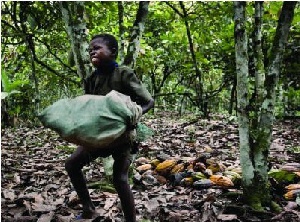A national Plan of Action (NPA) has been developed with key institutional stakeholders to fight against worst forms of child labour in the country.
A number of laws and policy measures have also been instituted over the last decade with the aim of complying with the constitutional provisions and moral obligations for the protection of children from abuse and exploitation.
The Minister of Employment and Labour Relations, Nii Armah Ashitey, who made this known, was speaking at the opening of ECOWAS-ILO Symposium on West Africa Regional Action Plan for the Elimination of Child Labour.
He said it was the responsibility of all to come up with pragmatic and urgent actions to save children, most of whom were subjected to prolonged servitude and conditions of severe deprivation.
He indicated that the solution to the menace of child labour could best be tackled through co-operation and collaboration with relevant institutions at the national and international levels, especially in the ECOWAS region.
Nii Ashitey noted that attempting to solve the problem in isolation would be more difficult and would take a longer time.
He, therefore, called for a greater collaboration between the Metropolitan, Municipal and District Assemblies (MMDAs).
The minister commended the National Steering Committee for the work done so far to address the challenges of child labour in the country and pleaded that more emphasis should be placed on field visits to the affected areas.
A Deputy Minister for Gender, Children and Social Protection, Ms Rachel Appoh, said the 2010 Ghana National Database on Human Trafficking at the Ministry revealed that 70 per cent of children in worst forms of child labour in Ghana could be found in the fishing and agricultural sectors, among others.
She said apart from domesticating the national laws in line with international instruments, strenuous efforts had been made to address child labour to ensure that it was reduced to the barest minimum by 2015, if not totally eliminated.
Ms Appoh announced that currently the ministry was formulating a child protection policy to provide proper safety and security for Ghanaian children.
The move, according to the Deputy Minister, was intended to build the capacities of officials handling the social protection interventions and issues relating to human trafficking, domestic violence, early childhood care and social welfare under the ministry.
She said the government would adopt a number of measures in the implementation of the Plan of Action with the aim of integrating and strengthening national mechanisms to protect the rights of the child and to combat child labour.
General News of Tuesday, 28 May 2013
Source: GNA

















